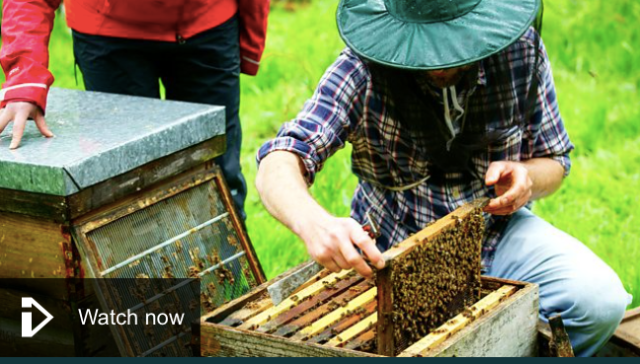Bees are everywhere nowadays. In the past few weeks I’ve seen them buzz up on Mary Berry Everyday and now Kate Humble’s new show Back to the Land.
I wasn’t even watching Back to the Land for the bees, I just found the idea of the show interesting – it focuses on rural food businesses making money in slightly unusual ways. For the first show in Pembrokeshire Kate visits a Wagu beef farmer, seaweed collector, a rapidly growing specialist chocolate business – and honey producers Nick and Annette Tonkin. The couple have 90 hives producing an average of around 3.5 tonnes of honey per year, though some of their income comes from selling queens and making marmalade.
“Can beekeeping really be a viable business?” asks Kate. Over the course of the show we hear about the precariousness of beekeeping in Wales’s ‘Wild West’ coastal weather. The family typically take the bulk of the honey off at the end of July, but a good crop is reliant on good weather. During a bumper year the bees can produce 8 tonnes of honey, but during filming Nick predicts they’ll only have under a tonne from the 2016 season. Under a tonne only brings in £16,000 – in years like that, just to break even the family must rely on selling queens and marmalade.
In the winter months Annette and their daughters stir up over 4,000 jars of citrus marmalade to supplement the honey income. Additionally Nick breeds and sells 400 queens each season, making around £6,000 annually from selling queens to beekeepers. He sells the queens in two stages. Once larvae are successfully grafted and have been fed in the hive for ten days, they can fetch £10 each. Left to grow into a fully fledged and mated queen, they can fetch £55. They’re sent all over the country by Royal Mail – “How very appropriate” comments Kate.
The grafting is incredibly delicate work. Nick mastered his beekeeping skills by watching his father tend to his hives. He looks to graft larvae at 24 hours old and 2mm long – “It’s almost when it’s too small to see, it’s the right size to graft”. Kate has a go but ends up squishing a young larvae.
Those of you in the UK can catch the show on iPlayer for the next 26 days: Back to the Land. I found all the businesses interesting. Some of the owners are making huge amounts of money and rapidly expanding, while others are barely getting by but are happy being able to live in the stunning Welsh countryside.


Thanks for writing about this. At least two people had told me about it, but I’d not been near a computer and so had forgotten. Tony on our allotment site was fascinated to have seen it on TV and was very interested! I will be showing him my grafting kit and have invited him to have a look at the bees.
LikeLike
You’re welcome. Impressive that you graft, I would like to try one day.
LikeLike
Sounds a fascinating programme. I will see if I have enough Internet to watch it. Amelia
LikeLike
Oh dear, only works in the U.K. because of the rights issue. 🙂
LikeLike
Yes I’m afraid so 😦 Time to have a UK holiday just so you can watch it!
LikeLike
I believe the second programme features a Devon cider maker whom I have visited in the past. She has recently been planting new orchards and I am keen to visit again to see what solitary bees are there. Last year the deer ate all the new buds!
LikeLike
Yes, it does. We see the new orchards and she mentions how important bee pollination is for the apples. A shame about the deer!
LikeLike
Pingback: Bees on ‘Back to the land with Kate Humble’ | Raising Honey Bees
Pingback: Bees on ‘Back to the land with Kate Humble’ | How To Raise Bees
I watched the show after reading your blog – I love to see how innovative people are, and how passionately they follow their dreams. Am looking forward to the Lakes next week!
LikeLike
Glad you watched it. I’m looking forward to catching up with tonight’s show too.
LikeLike